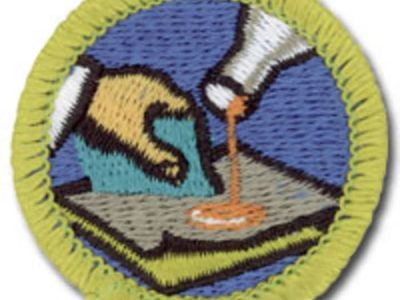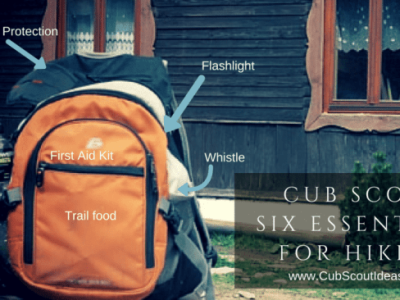Outdoor cooking equipment for scouts – When it comes to outdoor adventures, scouts need reliable and practical cooking equipment to prepare nutritious meals in the wilderness. This comprehensive guide explores the essential gear, cooking methods, food safety practices, meal planning, and environmental considerations for outdoor cooking.
Essential Cooking Equipment for Scouts
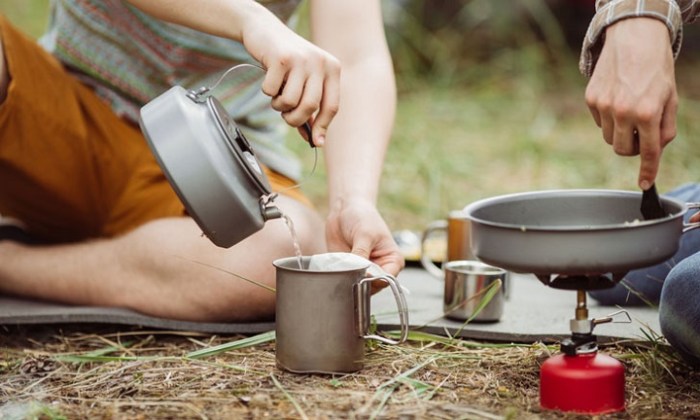
When embarking on outdoor adventures, scouts require reliable and portable cooking equipment to prepare nutritious meals. Essential cookware includes:
Pots and Pans, Outdoor cooking equipment for scouts
Durable pots and pans are crucial for cooking a variety of dishes. Choose lightweight and non-stick cookware to minimize weight and facilitate cleaning. Opt for materials like aluminum or stainless steel that can withstand outdoor conditions.
Utensils
A basic set of utensils is essential for food preparation and consumption. Include a spatula, spoon, fork, knife, and can opener. Choose utensils made from durable materials like stainless steel or plastic to withstand heat and rough handling.
Fire Starters
Fire starters are indispensable for igniting campfires, a crucial source of heat for cooking. Opt for reliable and easy-to-use options like matches, lighters, or fire starters that ignite with minimal effort.
Food Preparation and Safety
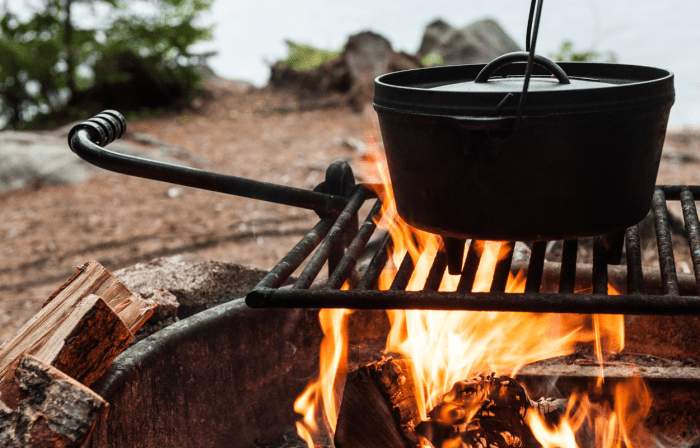
Proper food preparation and handling are crucial for outdoor cooking to prevent foodborne illnesses. This involves understanding the risks associated with consuming contaminated food and implementing appropriate measures to ensure safety.
When preparing food outdoors, it’s essential to maintain cleanliness and hygiene. Wash hands thoroughly with soap and water before handling food and use clean utensils and surfaces. Additionally, store food properly to prevent spoilage and contamination. Refrigerate or keep food in a cool place to inhibit bacterial growth.
Storing and Preserving Food in the Wilderness
In wilderness settings, storing and preserving food is vital to prevent spoilage and maintain nutritional value. Consider using insulated containers or coolers with ice packs to keep food cold. Alternatively, store food in airtight containers to prevent contamination and moisture absorption.
Risks of Foodborne Illnesses and Prevention
Foodborne illnesses can result from consuming contaminated food. Common symptoms include nausea, vomiting, diarrhea, and abdominal pain. To prevent foodborne illnesses, practice proper hygiene, cook food thoroughly to kill harmful bacteria, and avoid cross-contamination by separating raw and cooked foods.
- Wash hands thoroughly with soap and water before handling food.
- Use clean utensils and surfaces.
- Store food properly to prevent spoilage and contamination.
- Cook food thoroughly to kill harmful bacteria.
- Avoid cross-contamination by separating raw and cooked foods.
Meal Planning for Scouts: Outdoor Cooking Equipment For Scouts
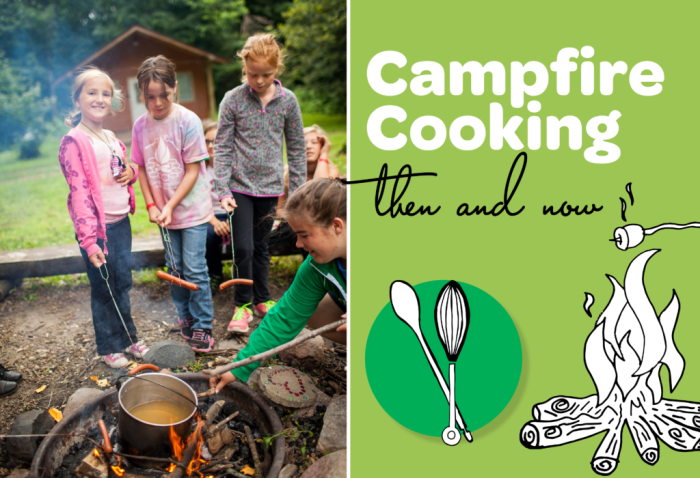
Providing nutritious and satisfying meals is crucial for scouts embarking on outdoor adventures. Proper meal planning ensures they have the energy to engage in activities while maintaining their health and well-being.
Sample Meal Plans
Sample meal plans should meet the energy demands of active youth, typically requiring 2,500-3,000 calories per day. Plans should include:
- Breakfast:Oatmeal with fruit, nuts, and milk; pancakes with syrup and butter; eggs with toast
- Lunch:Sandwiches with lean protein, vegetables, and cheese; pasta salad with grilled chicken; wraps with hummus, vegetables, and feta
- Dinner:Grilled burgers or chicken with roasted vegetables; pasta with tomato sauce and meatballs; tacos with lean ground beef or beans
- Snacks:Fruit, vegetables, trail mix, granola bars, yogurt
Dietary Restrictions and Preferences
It is essential to consider dietary restrictions and preferences when planning meals. Scouts with food allergies or intolerances must have alternative options available. Additionally, preferences for vegetarian, vegan, or gluten-free diets should be accommodated.
Open communication with scouts and their parents/guardians is crucial to identify any dietary needs or preferences. By tailoring meal plans to individual requirements, scouts can enjoy nutritious and satisfying meals while on outdoor adventures.
Cleanup and Leave No Trace Principles

Outdoor cooking should be an enjoyable experience, but it’s crucial to remember the importance of proper cleanup and waste disposal. Leaving the campsite pristine ensures a positive impact on the environment and preserves its beauty for future generations.
Leave No Trace Principles
Leave No Trace is a set of ethical guidelines that aim to minimize human impact on the natural environment. When applied to outdoor cooking, these principles include:
- Dispose of waste properly:Pack out all trash, including food scraps, packaging, and used utensils.
- Leave no trace of your fire:Extinguish all campfires thoroughly and bury any remaining ashes.
- Respect wildlife:Do not feed animals or disturb their habitats.
- Minimize your impact:Use established campsites and trails to avoid trampling vegetation.
Tips for Minimizing Environmental Impact
In addition to following Leave No Trace principles, here are some tips for reducing your environmental impact while cooking outdoors:
- Use reusable utensils:Bring your own plates, bowls, and utensils instead of using disposable ones.
- Choose biodegradable materials:Opt for biodegradable soap and dishcloths to minimize chemical impact on the environment.
- Conserve water:Use water sparingly and boil only the amount you need.
- Respect plant life:Avoid cutting or damaging vegetation for cooking purposes.
Outcome Summary
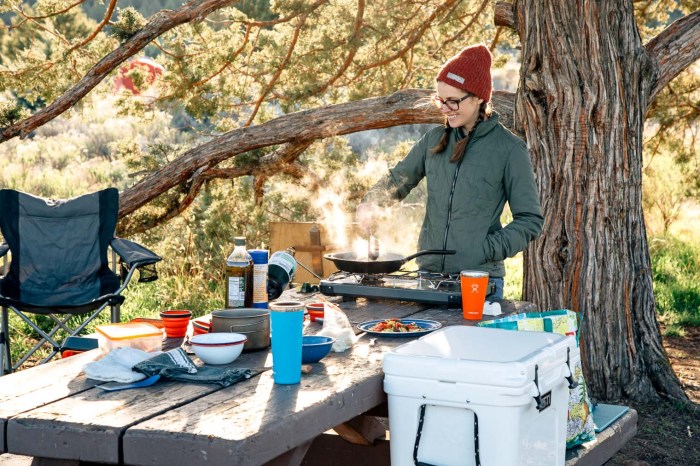
By following these guidelines and utilizing the recommended equipment, scouts can confidently embark on their outdoor adventures, well-equipped to prepare delicious and safe meals while adhering to responsible camping practices.
Top FAQs
What are the essential cookware items for scouts?
Essential cookware includes pots, pans, utensils, fire starters, and a Dutch oven for specialized cooking.
How do I build a safe campfire for cooking?
Choose a clear and level spot, dig a shallow pit, and arrange dry tinder, kindling, and firewood in a teepee shape.
What are the risks of foodborne illnesses when cooking outdoors?
Improper food handling, storage, and preparation can lead to foodborne illnesses, so it’s crucial to maintain hygiene and follow proper food safety practices.

